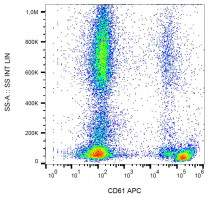ARG54306
anti-CD61 / Integrin beta 3 antibody [VIPL2] (APC)
anti-CD61 / Integrin beta 3 antibody [VIPL2] (APC) for Flow cytometry and Human,Primates
Cancer antibody; Cell Biology and Cellular Response antibody; Developmental Biology antibody; Immune System antibody; Signaling Transduction antibody
Overview
| Product Description | APC-conjugated Mouse Monoclonal antibody [VIPL2] recognizes CD61 / Integrin beta 3 |
|---|---|
| Tested Reactivity | Hu, NHuPrm |
| Tested Application | FACS |
| Specificity | The clone VIPL2 recognizes CD61, a 90-110 kDa transmembrane glycoprotein of integrin family, expressed on platelets, megacaryocytes, osteoclasts, endothelial cells and other cell types, including leucocytes and smooth muscle cells. HLDA V.; WS Code 5T-124 |
| Host | Mouse |
| Clonality | Monoclonal |
| Clone | VIPL2 |
| Isotype | IgG1 |
| Target Name | CD61 / Integrin beta 3 |
| Conjugation | APC |
| Alternate Names | GT; CD antigen CD61; CD61; BDPLT2; GPIIIa; BDPLT16; GP3A; Platelet membrane glycoprotein IIIa; Integrin beta-3 |
Application Instructions
| Application Suggestion |
|
||||
|---|---|---|---|---|---|
| Application Note | * The dilutions indicate recommended starting dilutions and the optimal dilutions or concentrations should be determined by the scientist. |
Properties
| Form | Liquid |
|---|---|
| Purification Note | The purified antibody is conjugated with cross-linked Allophycocyanin (APC) under optimum conditions. The conjugate is purified by size-exclusion chromatography and adjusted for direct use. No reconstitution is necessary. |
| Buffer | PBS, 15 mM Sodium azide and 0.2% (w/v) high-grade protease free BSA |
| Preservative | 15 mM Sodium azide |
| Stabilizer | 0.2% (w/v) high-grade protease free BSA |
| Storage Instruction | Aliquot and store in the dark at 2-8°C. Keep protected from prolonged exposure to light. Avoid repeated freeze/thaw cycles. Suggest spin the vial prior to opening. The antibody solution should be gently mixed before use. |
| Note | For laboratory research only, not for drug, diagnostic or other use. |
Bioinformation
| Database Links | |
|---|---|
| Gene Symbol | ITGB3 |
| Gene Full Name | integrin, beta 3 (platelet glycoprotein IIIa, antigen CD61) |
| Background | CD61 (beta3 integrin) is a transmembrane glycoprotein, which associates with CD41 or CD51 molecules to form heterodimeric adhesion receptores. CD41/CD61 complex is one of the earliest markers of the megakaryocytic lineage. It binds to fibronectin, fibrinogen and von Willebrand factor, and is involved in platelet aggregation. CD51/CD61 complex has similar binding properties and is involved in modulating migration and survival of angiogenic endothelial cells. |
| Function | Integrin alpha-V/beta-3 (ITGAV:ITGB3) is a receptor for cytotactin, fibronectin, laminin, matrix metalloproteinase-2, osteopontin, osteomodulin, prothrombin, thrombospondin, vitronectin and von Willebrand factor. Integrin alpha-IIb/beta-3 (ITGA2B:ITGB3) is a receptor for fibronectin, fibrinogen, plasminogen, prothrombin, thrombospondin and vitronectin. Integrins alpha-IIb/beta-3 and alpha-V/beta-3 recognize the sequence R-G-D in a wide array of ligands. Integrin alpha-IIb/beta-3 recognizes the sequence H-H-L-G-G-G-A-K-Q-A-G-D-V in fibrinogen gamma chain. Following activation integrin alpha-IIb/beta-3 brings about platelet/platelet interaction through binding of soluble fibrinogen. This step leads to rapid platelet aggregation which physically plugs ruptured endothelial surface. Fibrinogen binding enhances SELP expression in activated platelets (By similarity). In case of HIV-1 infection, the interaction with extracellular viral Tat protein seems to enhance angiogenesis in Kaposi's sarcoma lesions. [UniProt] |
| Research Area | Cancer antibody; Cell Biology and Cellular Response antibody; Developmental Biology antibody; Immune System antibody; Signaling Transduction antibody |
| Calculated MW | 87 kDa |
| PTM | Phosphorylated on tyrosine residues in response to thrombin-induced platelet aggregation. Probably involved in outside-in signaling. A peptide (AA 740-762) is capable of binding GRB2 only when both Tyr-773 and Tyr-785 are phosphorylated. Phosphorylation of Thr-779 inhibits SHC binding. |
Images (1) Click the Picture to Zoom In






